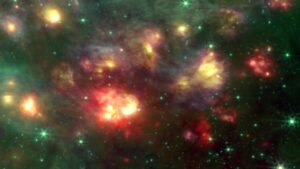A new liquid that could sustain life on planets devoid of water.

For years, the search for extraterrestrial life has primarily focused on the presence of liquid water. However, a recent study from the Massachusetts Institute of Technology has introduced a surprising twist: there are other liquids that could potentially sustain biological processes. This groundbreaking discovery, made serendipitously in a laboratory, suggests that worlds previously disregarded could actually host life forms adapted to environments vastly different from Earth.
## From Venus to the Laboratory: A Surprising Find
The research initially began in the extreme conditions of Venus, a planet shrouded in dense clouds of sulfuric acid. Dr. Rachana Agrawal and Professor Sara Seager from MIT set out to analyze the interaction between evaporated sulfuric acid and organic compounds. During an experiment involving glycine, they observed something unexpected: despite most of the acid evaporating, a layer of liquid persisted. Further analysis unveiled the creation of an ionic liquid, formed through a chemical reaction that transfers hydrogen atoms and results in a stable substance capable of withstanding varying temperatures and pressures.

### Ionic Liquids: A Gateway to Warmer Worlds
Comprising of salts that remain in liquid form below 100°C, these ionic liquids possess low vapor pressure and can endure extreme heat. In their experiments, the researchers combined sulfuric acid with over 30 nitrogen-containing compounds, including those commonly found on rocky planets like basaltic rocks. The consistent outcome was the formation of the ionic liquid even at temperatures as high as 180°C and pressures significantly lower than those on Earth. This discovery hints at the potential existence of stable liquid “pools” on barren planets, serving as havens for life forms specially adapted to such conditions.
### Beyond Water: Exploring New Avenues of Habitability
While astrobiology has traditionally focused on planets within the “habitable zone” where liquid water could exist, the discovery of ionic liquids broadens the scope significantly. As life only requires a liquid medium for metabolic processes, the presence of these unique liquids expands the possibilities. Given that sulfuric acid and nitrogen-containing compounds have been detected on various celestial bodies in our solar system, the likelihood of these liquids occurring naturally beyond Earth is promising.
The next phase of research involves investigating which biomolecules could thrive in ionic liquids, paving the way for new frontiers in exploration. As Professor Seager eloquently states, “We have opened a Pandora’s box for future research.” This revelation has the potential to revolutionize the way we search for life in the universe, challenging our previous assumptions and expanding our understanding of habitable environments.





